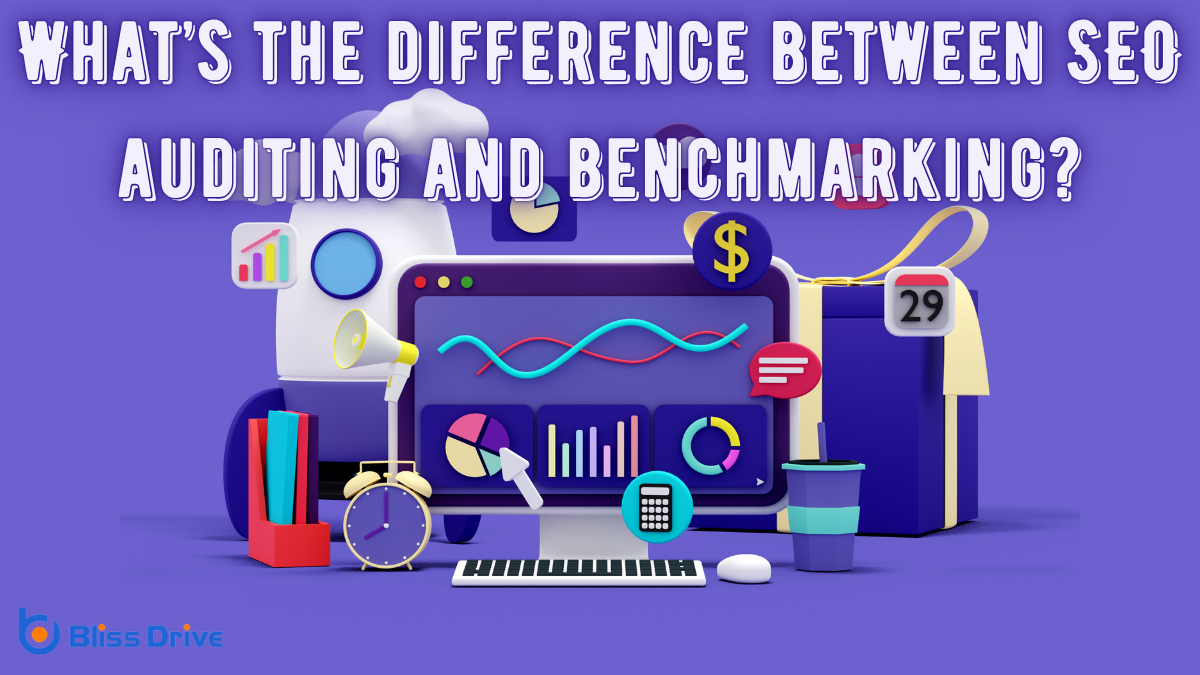Digital Marketing Services
Learn More About Us

When you’re exploring the digital marketing landscape, understanding the difference between SEO auditing and benchmarking is vital. SEO auditing examines a website’s internal health, identifying areas for improvement. In contrast, benchmarking measures your site against competitors and industry norms. While both are essential for optimizing online presence, each serves a unique role in your strategy. Curious about how these processes can work together to elevate your website’s performance?
When it comes to improving your website's performance, understanding SEO auditing is vital. You need to grasp that an SEO auditA thorough analysis of a website’s SEO performance and areas for improvement. is like a health check-up for your site. It helps you identify underlying issues affecting your site’s visibility and ranking on search engines.
By conducting an SEO audit, you’ll gain insights into technical elements and on-page factors that need tweaking. It's a process where you scrutinize your website’s structure, keyword usage, and overall content quality.
You'll be able to pinpoint issues like broken links, slow-loading pages, or poor mobile responsiveness. Acting on these findings allows you to optimize your site for better search engine performance.
It’s fundamental for maintaining a competitive edge and ensuring your content reaches the right audience effectively.

To effectively conduct an SEO audit, you must focus on its key components. Start by examining your website’s technical health. Check for issues like broken links, slow loading times, and mobile-friendliness. These affect user experience and search engine rankingsThe position at which a website appears in the SERP..
Next, review on-page elements. Verify titles, headings, and meta descriptions contain relevant keywordsWords or phrases that users type into search engines to find information. and follow best practices. Content quality matters, too. It should be unique, valuable, and engaging for your audience.
Don’t forget about off-page factors. Analyze your backlink profile to determine its strength and relevance. Look for opportunities to improve or disavow harmful links.
Finally, assess your website’s analyticsThe systematic computational analysis of data or statistics to gain insights and support decision-ma.... Track metrics like organic trafficVisitors who come to a website through unpaid search engine results., bounce rateThe percentage of visitors who leave a website after viewing only one page., and conversionThe completion of a desired action by a referred user, such as making a purchase or filling out a fo... rates to understand your site’s performance and identify areas for improvement.
You can't underestimate the importance of SEO auditing for your website.
It helps you spot SEO issues, enhance website performance, and boost your search rankings.
Envision this: your website is a bustling digital storefront, but without proper care, it can quickly become a neglected space.
SEO auditing helps you pinpoint issues that might be holding your website back from reaching its full potential. By identifying these SEO issues, you lay the groundwork for improvements that enhance visibility and traffic.
Here are three common issues you might encounter during an SEO audit:
Address these, and your site will thrive.
Addressing SEO issues is just the beginning. Once you've identified those pesky problems, it's time to enhance your website's performance.
An SEO audit helps you understand how your site currently functions, uncovering opportunities to improve speed, navigation, and user experience. By optimizing these elements, you guarantee visitors have a seamless journey, which encourages them to stay longer and explore more.
Your content should load quickly, and your site should be easy to navigate on any device. Guaranteeing this not only keeps users engaged but also reduces bounce rates.
Pay attention to mobile-friendliness and accessibility, as these are critical for modern audiences. Remember, a well-performing website is more appealing, and with an SEO audit, you'll have the roadmap to achieve it.
To achieve top search rankings, a well-executed SEO audit is indispensable. It identifies the areas where your website can improve and helps you focus on what's most essential for boosting visibility.
An SEO audit offers a clear roadmap to enhance your site's performance in search results. Here’s how it can benefit you:
In short, an SEO audit is your key to opening better search rankings.
Benchmarking, a critical tool in SEO, allows you to measure your website's performance against competitors and industry standards. By identifying where you stand in the digital landscape, you can pinpoint strengths and weaknesses.
This process involves examining metrics like page speedThe time it takes for a webpage to load, affecting user experience and conversion rates., keyword rankings, and backlink profiles. You'll get a clear picture of how effective your SEO strategies are and where improvements are necessary.
To start, you'll need to gather data from tools like Google Analytics and SEMrush. These platforms provide insights into traffic patterns, bounce rates, and keyword success.
You'll compare these metrics with industry benchmarks to understand your position. This comparison helps you set realistic goals and adjust strategies to enhance your online presence, ultimately driving more traffic and improving search rankings.

When you're comparing benchmarking to SEO auditing, you'll notice they serve different purposes and objectives.
Benchmarking focuses on measuring your site's performance against competitors, while SEO auditing is about identifying issues and opportunities within your site.
The tools and techniques vary as well, with benchmarking offering insights for strategic positioning and SEO audits providing actionable fixes for improvement.
While SEO auditing and benchmarking both aim to enhance a website's performance, their purposes and objectives diverge greatly.
When you conduct an SEO audit, you're primarily focused on evaluating your website's current state. It's about identifying strengths, weaknesses, and areas for improvement.
Benchmarking, on the other hand, involves comparing your website's performance against industry standards or competitors. This process helps you understand where you stand in the market.
Here are some key differences:
Understanding these differences empowers you to use each method effectively.
To effectively navigate the multifaceted domain of website performance, it’s crucial to recognize the specific tools and techniques unique to both SEO auditing and benchmarking.
When you engage in SEO auditing, you'll rely on tools like Google Analytics, SEMrush, and Ahrefs to analyze on-page elements, backlinksLinks from other websites pointing to your website, crucial for SEO., and keyword effectiveness. These tools help you identify technical issues and optimization opportunities.
In contrast, benchmarking focuses on comparing your website’s performance against industry standards or competitors. Tools like SimilarWeb and Alexa offerThe specific product or service being promoted by affiliates. insights into traffic patterns and competitive positioning.
You’ll examine metrics such as page speed, user engagementThe level of interaction and involvement users have with social media content., and conversion rates. By understanding these differences, you can tailor your approach, ensuring you use the right methods to assess and enhance your website’s overall performance.
The distinction between outcomes and actionability in SEO auditing and benchmarking is pivotal for improving website performance.
When you conduct an SEO audit, you identify issues that need fixing, but benchmarking provides a comparative analysis against competitors.
Here's how they differ:
Understanding your competitors isn’t just beneficial; it’s essential in the benchmarking process. By analyzing their strengths and weaknesses, you can uncover gaps and opportunities in your own strategy.
Competitor analysisEvaluating the strengths and weaknesses of competitors’ SEO strategies. allows you to set realistic benchmarks based on industry standards rather than guesswork. It’s about knowing what others are doing well and where they fall short, so you can carve out your nicheA specific segment of the market targeted by affiliates to promote products or services..
You’ll gain insights into successful tactics that can be adapted to improve your performance. For instance, if a competitor dominates a particular keyword, understanding why can help refine your approach.
Effective SEO auditing hinges on leveraging the right tools and techniques to enhance your website's performance.
You'll want to focus on three main areas to guarantee a thorough audit.

To successfully benchmark your SEO efforts, start by identifying key performance indicators (KPIs) that align with your goals.
Use competitor analysis strategies to compare your performance with industry leaders and spot opportunities for improvement.
Regularly track progress metrics to guarantee you're on the right path and make necessary adjustments.
Maneuvering the landscape of SEO requires focus and precision, especially when it comes to benchmarking your efforts.
Key Performance Indicators (KPIs) provide the measurable metrics you need to track your progress and optimize your strategy. Here are three vital KPIs to monitor:
While maneuvering through the complexities of SEO, you'll find that understanding your competition is key to successful benchmarking. Start by identifying your top competitors.
Look at their website structure, keyword usage, and backlink profiles. Use tools like SEMrush or Ahrefs to gather data on their organic traffic and ranking keywords. Analyze their content strategies—what topics they're covering and how often they're posting. This helps you spot gaps and opportunities in your own strategy.
Don't shy away from studying their social media presence. See which platforms they’re active on and how they engage with their audience.
This can provide valuable insights into their brand voiceThe consistent tone and style of communication used by a brand across all channels. and customer interactions. By understanding these elements, you can refine your SEO strategy to outperform your rivals.
Although understanding your competitors is essential, tracking your own progress metrics is equally important for successful SEO benchmarking. You need to know how your strategies are performing to make informed decisions.
Here’s how you can effectively track your progress:
To effectively enhance your website's performance, integrating SEO auditing and benchmarking into your strategy is essential.
Start by scheduling regular audits to uncover technical issues, content gaps, and on-page optimizationImproving individual webpages to rank higher and earn more relevant traffic in search engines. opportunities. Use these insights to make informed adjustments, ensuring your site aligns with best practices.
Next, benchmark your site's performance against industry standards and competitors. This helps identify where you stand and what areas need improvement.
Now that you've integrated SEO auditing and benchmarking into your strategy, let's explore their impact in real-world scenarios.
You'll see how businesses have used these tools to enhance online performance and gain a competitive edge. Here are three case studiesIn-depth analyses of specific instances or examples to highlight success stories or lessons learned.... to illustrate:
1. E-commerce Growth: A retail company used SEO auditing to identify technical issues, improving their site structure and page speed.
Benchmarking against competitors revealed content gaps, leading to a 40% increase in organic traffic.
2. Local Visibility Boost: A small restaurant chain conducted an SEO audit to optimize local listings.
Benchmarking highlighted their top competitors’ social media strategies, resulting in a 25% increase in local search appearances.
3. Content StrategyA plan for creating, publishing, and managing content to meet business goals. Revamp: A blog site used auditing to refine keyword strategies.
Benchmarking helped them adopt best practices, achieving a 50% rise in search engine rankings.
By integrating SEO auditing and benchmarking into your strategy, you’ll tackle both immediate and long-term challenges. Auditing lets you fix technical issues and improve content quality, boosting your website’s internal health. Meanwhile, benchmarking helps you understand your position in the market, guiding your strategic decisions. Together, these approaches provide an all-encompassing roadmap to enhance your online presence and stay ahead of competitors. Don’t ignore either; they’re both essential for optimizing your website’s performance.
